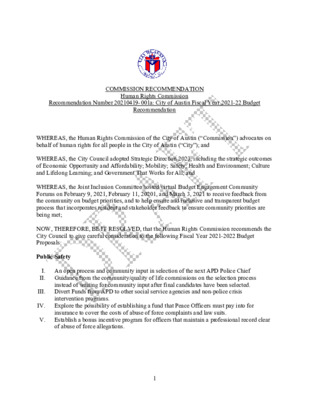20210419-001a 2021-2022 Budget Recommendation DRAFT — original pdf
Backup

COMMISSION RECOMMENDATION Human Rights Commission Recommendation Number 20210419-001a: City of Austin Fiscal Year 2021-22 Budget Recommendation WHEREAS, the Human Rights Commission of the City of Austin (“Commission”) advocates on behalf of human rights for all people in the City of Austin (“City”); and WHEREAS, the City Council adopted Strategic Direction 2023, including the strategic outcomes of Economic Opportunity and Affordability; Mobility; Safety; Health and Environment; Culture and Lifelong Learning; and Government That Works for All; and WHEREAS, the Joint Inclusion Committee hosted virtual Budget Engagement Community Forums on February 9, 2021, February 11, 20201, and March 3, 2021 to receive feedback from the community on budget priorities, and to help ensure and inclusive and transparent budget process that incorporates resident and stakeholder feedback to ensure community priorities are being met; NOW, THEREFORE, BE IT RESOLVED, that the Human Rights Commission recommends the City Council to give careful consideration to the following Fiscal Year 2021-2022 Budget Proposals: Public Safety IV. V. I. An open process and community input in selection of the next APD Police Chief II. Guidance from the community/quality of life commissions on the selection process instead of waiting for community input after final candidates have been selected. III. Divert Funds from APD to other social service agencies and non-police crisis intervention programs. Explore the possibility of establishing a fund that Peace Officers must pay into for insurance to cover the costs of abuse of force complaints and law suits. Establish a bonus incentive program for officers that maintain a professional record clear of abuse of force allegations. 1 I. II. Please see: Budget forum meeting February 9, 2021 at https://www.speakupaustin.org/budget-2022 Health and Environment I. II. Community approach for health care navigation and support: Resources exist for specific communities, but coverage is not consistent across all constituencies. The City of Austin should provide coordination/oversight to ensure resources are equitable and address gaps III. Outreach and Navigation: Digital Access: Includes Wi-Fi, devices, and training. Need to address different needs for seniors, kids in school, adults working from home, people with disabilities and/or who are homebound, people who need access to healthcare (e.g. telehealth), access to workforce development/job postings, etc. Targeted interventions specific to each community are needed. The City should include these recommendations in their digital inclusion strategic plan (TARA “Telecommunications & Regulatory Affairs”) Funding should be provided for programs to enroll inmates released into the community in health care coverage insurance plans. IV. V. Please see: Budget Forum meeting February 11, 2021 at https://www.speakupaustin.org/budget-2022 Economic Opportunity, Culture, & Affordability Public Utilities: Citizens of Austin should not be financially responsible for power and water they did not have; set aside financial resources from the Mayor’s strike fund to cover these costs. Increased prices for utilities and price gouging to pay for the damage to the City’s infrastructure caused by the February 2021 Winter Storm: The City must provide financial support to people who received bills with increased costs because the cost of repair to the infrastructure is being passed on to them. III. Allow citizens of Austin to pay the costs of any increased utility bills caused by the storm in installments without penalty so that they economic impact is minimized. IV. A hub for research and dispatch: Use funds to establish a natural disaster emergency plan to include a dispatch for resources (food, water, etc.) as well as an official intake and communication hub. Explore the possibility of a local tech company developing this at no cost to the city. The City should study access to stable and affordable housing and transit. Funding for legal assistance for immigrants V. VI. VII. Operational funding for nonprofits VIII. Additional funding for EDD, communications and outreach IX. Increase economic opportunities, access to capital, small business support, and transit in East Austin 2 XI. XII. XIII. XIV. XV. X. Address the need for digital access for seniors and low income neighborhoods, including public libraries, senior centers, Wi-Fi hotspots Provide ADA compliant access for people with disabilities (transportation/accessible and affordable housing) Provide funding for repairs and more funding for rental assistance to prevent homelessness Explore the creation of worker owned cooperatives Provide funding for training to transition to new employment in careers with sustainable living wages to provide economic stability Provide funding for multigenerational programs and workplaces e.g. pathways to career and education for parents in low-income families, internship opportunities for seniors XVI. More funding and support for existing cultural districts and community centers across all districts (Six Square Black Cultural District, LGBTQIA+ resources, Latino Cultural District, and Representation of Asian Arts and Culture) XVII. District 3 specific support for LGBTQIA+ professionals and nonprofits XVIII. Provide RISE funding beyond the pandemic; add additional funding equivalent to the 25 million dollar rental assistance program. Increase support for interpreters, translation, multi-lingual emergency response including Asian languages Inclusion centering on intersectionality across constituencies Provide affordable housing options for large low-income families, not just single/small units Provide funding to pathways to education and careers for people without documentation Provide and set aside emergency funds for natural and other catastrophes that impact the City of Austin XXIV. Approve funds to repay community organization, nonprofits, Non-Governmental Organizations (NGOs) and individuals that expended financial capital during the freeze of February 2021 in order to assist the community. Extend the eviction moratorium and provide funding for rental assistance to those in need. XIX. XX. XXI. XXII. XXIII. XXV. XXVI. Allocate operational funding and resources for small businesses and non-profits, particular those that helped during the storm—help them grow and expand with guidance. XXVII. Use funding to establish equity districts: Public/Private Partnerships where tech companies are asked to contribute funds to equity efforts in the city. Please see: Budget Forum meeting March 3, 2021 at https://speakupaustin.org-2022 CRT (Community Resilience Trust) press releases and pending financial reports to the City Manager’s Office and Mayor Adler 3